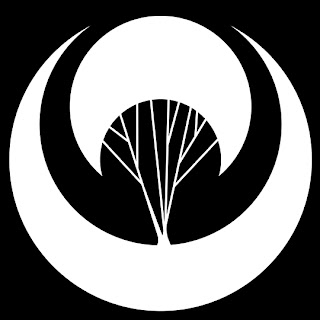Monday, November 30, 2009
Cryptolect
cryptolect \ˈkript-ō-ˌlekt\ noun: a secretive language form used by a subculture; an arcane cant
Etymology: crypt- concealed, hidden, secret (from ancient Greek kruptos) + -lect form of speech (from ancient Greek lektos)
I dare you to find a more awesome word.
Sunday, November 29, 2009
Whack
whack \ˈwak\ noun: condition; state
Etymology: unknown (at least to me)
I purposefully left out all of whack’s definitions except the one that pertains to the phrase “out of whack.” Seen in this light it makes sense that something misaligned from its natural condition or state is “out of whack.” (Whack’s more common definition “a punch or strong blow” seems unrelated to “a condition or state,” but who knows? Stranger things have turned out to be true. If you can shed some light on this mess, please post a comment.
Saturday, November 28, 2009
Saccade
saccade \sa-ˈkäd\ noun: a small, rapid, jerky, voluntary movement of the eye, especially as it jumps from fixation on one point to another (as in reading)
Etymology: French, twitch, jerk, from Middle French, from saquer to pull, draw
Microsaccades resemble involuntary, miniature saccades. “Their implementation in the oculomotor system is unknown,” according to M. Rolfs, R. Kliegl & R. Engbert in “Toward a model of microsaccade generation: The case of microsaccadic inhibition,” published in Journal of Vision (2008).
Friday, November 27, 2009
Texel
texel \ˈtek-səl\ noun: in computer graphics, an image representing the smallest unit of a texture, containing no repeated sections and that may be repeated to tile a region of the display
Etymology: tex (from texture) + el (from element)
The naming of yesterday’s and today’s terms were patterned after the naming of the word pixel.
Thursday, November 26, 2009
Voxel
voxel \ˈvok-səl\ noun: the three-dimensional analogue of a pixel
Etymology: vo (from volumetric) + xel (from pixel)
Voxel looks as if its etymology could be vox (Latin voice) + el (from element), which would make a voxel the audio equivalent of a pixel. (This, of course, is not the case.)
Wednesday, November 25, 2009
Pixel
pixel \ˈpik-səl\ noun: a single point in a digital raster image, often represented as a square in a two-dimensional grid
Etymology: pix (plural of pic) + el (from element)
The etymology for pixel may be unsurprising, but I still found it interesting since I’d never really paused to consider the word’s origin before.
Tuesday, November 24, 2009
Collimate
collimate \ˈkä-lə-ˌmāt\ transitive verb: to make (as light rays) parallel
Etymology: Latin collimatus, past participle of collimare, manuscript variant of collineare to make straight, from com- + linea line
Sometimes a word you’ve never heard before sounds perfectly familiar, as if you two were waiting to be friends your entire lives.
Monday, November 23, 2009
Imbroglio
imbroglio \im-ˈbrōl-(ˌ)yō\ noun: 1. a confused mass, 2 a. an intricate or complicated situation (as in a drama or novel), b. an acutely painful or embarrassing misunderstanding, c. a violently confused or bitterly complicated altercation; embroilment, d. scandal {survived the political imbroglio}
Etymology: Italian, from imbrogliare to entangle, from Middle French embrouiller, from en- + brouiller to jumble
Imbroglio flows so lyrically for such nasty meanings.
Sunday, November 22, 2009
Sobriquet
sobriquet \ˈsō-bri-ˌkā, -ˌket\ noun: a descriptive name or epithet; nickname
Etymology: French
I have nothing against loan words, but why does the English language need sobriquet? What does it do that nickname or epithet doesn’t?
Saturday, November 21, 2009
Volupté
volupté \voh-luep-tā\ noun: pleasure; sensuality
Etymology: French
Why do I get the feeling volupté is more pleasureable than pleasure, more sensual than sensuality?
Friday, November 20, 2009
Chorography
chorography \kə-ˈrä-grə-fē\ noun: 1. the art of describing or mapping a region or district, 2. a description or map of a region, 3. the physical conformation and features of such a region
Etymology: Latin chorographia, from Greek chōrographia, from chōros place + -graphia -graphy
I hope you didn’t mistake this word for choreography at first blush.
Thursday, November 19, 2009
Perseveration
perseveration \pər-ˌse-və-ˈrā-shən\ noun: pathological repetition of a word, phrase, gesture or act despite the absence or cessation of a stimulus, often associated with brain damage or schizophrenia
Etymology: Latin perseveration-, perseveratio, from perseverare, from per- through + severus severe
We all know the word perseverance; it stems from the same root as perseveration, but it is a different kind of steadfastness, one that is looked upon as a favorable trait.
Wednesday, November 18, 2009
Laurasia
Laurasia \loh-ˈrā-zhə\ geographical name: one of two supercontinents resulting from the breakup of Pangaea, comprising what is now North America and Eurasia
Etymology: laur- (from Laurentia) + -asia (from Eurasia)
Laurentia is the name given to the geologically stable continental crust that makes up North America. It derives its name ultimately from the St. Lawrence River.
Tuesday, November 17, 2009
Gondwana
Gondwana \gän-ˈdwä-nə\ geographical name: one of two supercontinents resulting from the breakup of Pangaea, comprising what is now South America, Africa, India, Australia and Antarctica
Etymology: from the Gondwana region of central northern India, where some of the earliest rock formations of the supercontinent were first investigated
Gondwana was formerly known as Gondwanaland.
Monday, November 16, 2009
Pangaea
Pangaea \pan-ˈjē-ə\ geographical name: hypothetical land area believed to have once connected nearly all of the earth’s landmasses together
Etymolgy: Greek pan- all + Gaia ancient Greek earth goddess
Boats would have been less useful back in the day.
Sunday, November 15, 2009
Panacea
panacea \ˌpa-nə-ˈsē-ə\ noun: a remedy for all ills or difficulties; cure-all
Etymology: Latin, from Greek panakeia, from panakēs all-healing, from pan- all + akos remedy
This word always makes me think of pancakes.
Saturday, November 14, 2009
Intonarumore
intonarumore \ēn-ˌtōn-ä-rü-ˈmohr-ā\ noun: one of a family of mechanical noise-generating musical instruments invented by Italian Futurist Luigi Russolo
plural intonarumori
Etymology: Italian intonare to intone + rumore noise
Composer/musicologist Luciano Chessa recreated sixteen of Russolo's intonarumori and presented them at a concert this past Thursday at New York City’s Town Hall concert venue. It was a maddening, exilarating performance. If you want to learn more about these mesmerizing instruments, here’s Wikipedia’s article on the intonarumori.
Friday, November 13, 2009
Gemütlichkeit
Gemütlichkeit /gəˈmyːtlɪçkaɪ̯t/ noun: the state or fact of being gemütlich; twee cosiness
Etymology: German Gemütlichkeit cosiness
In case you can’t infer gemütlich’s definition from above, Wiktionary calls it “comfortable, middle-class, cosy, twee.”
Thursday, November 12, 2009
Bedizen
bedizen \bi-ˈdī-zən\ transitive verb: to dress or adorn gaudily
Etymology: English be- + dizen, from Middle Dutch disen, from Low German dise
The noun form is bedizenment.
Wednesday, November 11, 2009
Lexicographer
lexicographer \ˌlek-sə-ˈkä-grə-fər\ noun: an author or editor of a dictionary
Etymology: Late Greek lexikographos, from lexikon (from neuter of lexikos of words, from Greek lexis word, speech, from legein to say) + Greek -graphos writer (from graphein to write)
“Dictionaries are like watches; the worst is better than none, and the best cannot be expected to go quite true.” – Samuel Johnson (quoted in The Secret Life of Words by Henry Hitchings)
Tuesday, November 10, 2009
Simper
simper \ˈsim-pər\ noun: a silly smile; smirk
intransitive verb: to smile in a silly manner
transitive verb: to say with a simper {simpered an apology}
Etymology: akin to Middle Dutch zimperlijc elegant, Dan dialect simper affected, coy
“The Count succumbs to her perfidious simpers.” Who is this perfidious simperer, you wonder? She is the title character in Anton Giuglio Bragaglia’s 1917 film Thaïs, which screened at Anthology Film Archives last night as part of its series celebrating the 100th anniversary of the birth of Italian Futurism. The quotation comes from Virginie Bobin’s live translation of the French intertitles.
Monday, November 9, 2009
Chopstick
chopstick \ˈchäp-ˌstik\ noun: one of a pair of slender sticks held between thumb and fingers and used chiefly in Asian countries to lift food to the mouth
Etymology: Chinese Pidgin English chop fast + English stick
In The Secret Life of Words Henry Hitchings explains, “The utensils we call chopsticks are known to the Chinese as kwai-tsze, which literally means ‘nimble boys’. Chopsticks is a crude equivalent, partly inspired by the pidgen word chop, ‘quick’. (The pidgen English exclamation chop chop replicates the Chinese kwai kwai.)”
Sunday, November 8, 2009
Persiflage
persiflage \ˈpər-si-ˌfläzh, ˈper-\ noun: frivolous bantering talk; light raillery
Etymology: French, from persifler to banter, from per- thoroughly + siffler to whistle, hiss, boo, ultimately from Latin sibilare to hiss, whistle (of imitative origin)
Compare persiflage to badinage.
Saturday, November 7, 2009
Perspicacious
perspicacious \ˌpur-spi-ˈkā-shəs\ noun: having keen mental perception and understanding; discerning
Etymology: Late Latine perspicācitās discernment, from Latin perspicax sharp-sighted, from perspicere to see through
Don’t confuse perspicacious with yesterday’s entry perspicuous.
Friday, November 6, 2009
Perspicuous
perspicuous \pər-ˈspi-kyə-wəs\ adjective: 1. not subject to misinterpretation or more than one interpretation; clear, lucid, easy to understand, 2. (rare) transparent, transluscent
Etymology: Latin perspicuus, from perspicere to see through
Compare perspicuous to diaphanous, pellucid and transpicuous.
Thursday, November 5, 2009
Sprezzatura
sprezzatura \sprāt-tsä-ˈtü-rä\ noun: 1. studied nonchalance, 2. perfect conduct or performance of something (as an artistic endeavor) without apparent effort
Etymology: Italian
Apparantly the early 19th-century British dandy would spend excessive time before his mirror tying his cravat in such a manner as to appear hastily thrown on, albeit perfectly so. A contemporary version of sprezzatura as it pertains to fashioin or vanity is the willful cultivation of “bedhead” by means other than having slept in a bed.
Wednesday, November 4, 2009
Plexure
plexure \ˈplek-shər\ noun: 1. the act or process of weaving together; interweaving, 2. that which is woven together
Etymology: New Latin, from Latin plectere to braid
The bend of the weave is the flexure of the plexure.
Tuesday, November 3, 2009
Cigar
cigar \si-ˈgär\ noun: a small roll of tobacco leaf for smoking
Etymology: Spanish cigarra cicada, from the resemblance of a cured tobacco leaf to a cicada’s wing
It’s true: compare this picture of cured tobacco leaves with this one of cicadas brandishing their wings.
Monday, November 2, 2009
Porcelain
porcelain \ˈpohr-s(ə-)lən\ noun: 1. a hard, fine-grained, sonorous, nonporous and usually translucent and white ceramic ware that consists essentially of kaolin, quartz and a feldspathic rock and is fired at a high temperature
Etymology: Middle French porcelaine cowrie shell, porcelain, from Italian porcellana, from porcello little pig, from Latin porcellus, diminutive of porcus pig
That etymology may give you more questions than answers, so here’s a further explanation. According to the Oxford English Dictionary, “[Porcelain] was apparently so named on account of the resemblance of its translucent surface to the nacreous shell of the [cowrie].” Where does the pig come in? Henry Hitchings clears that up in The Secret Life of Words: “The word [porcelain] comes from the Italian for a cowrie shell; literally, porcellana was a ‘little pig’, and the connection seems grounded in the glossy shell’s resemblance either to a pig’s back or to a sow’s glistening crinkled vagina.” So now you know.
Sunday, November 1, 2009
Nacre
nacre \ˈnā-kər\ noun: the hard pearly iridescent substance forming the inner layer of a mollusk shell; mother-of-pearl
nacreous \ˈnā-krē-əs\ adjective: 1. possessing the qualities of, consisting of, or abounding in nacre, 2. iridescent
Etymology: French, from Middle French, from Old Italian naccara drum, nacre, from Arabic naqqāra drum
How did a word for a drum come to mean mother-of-pearl?
Subscribe to:
Comments (Atom)

































